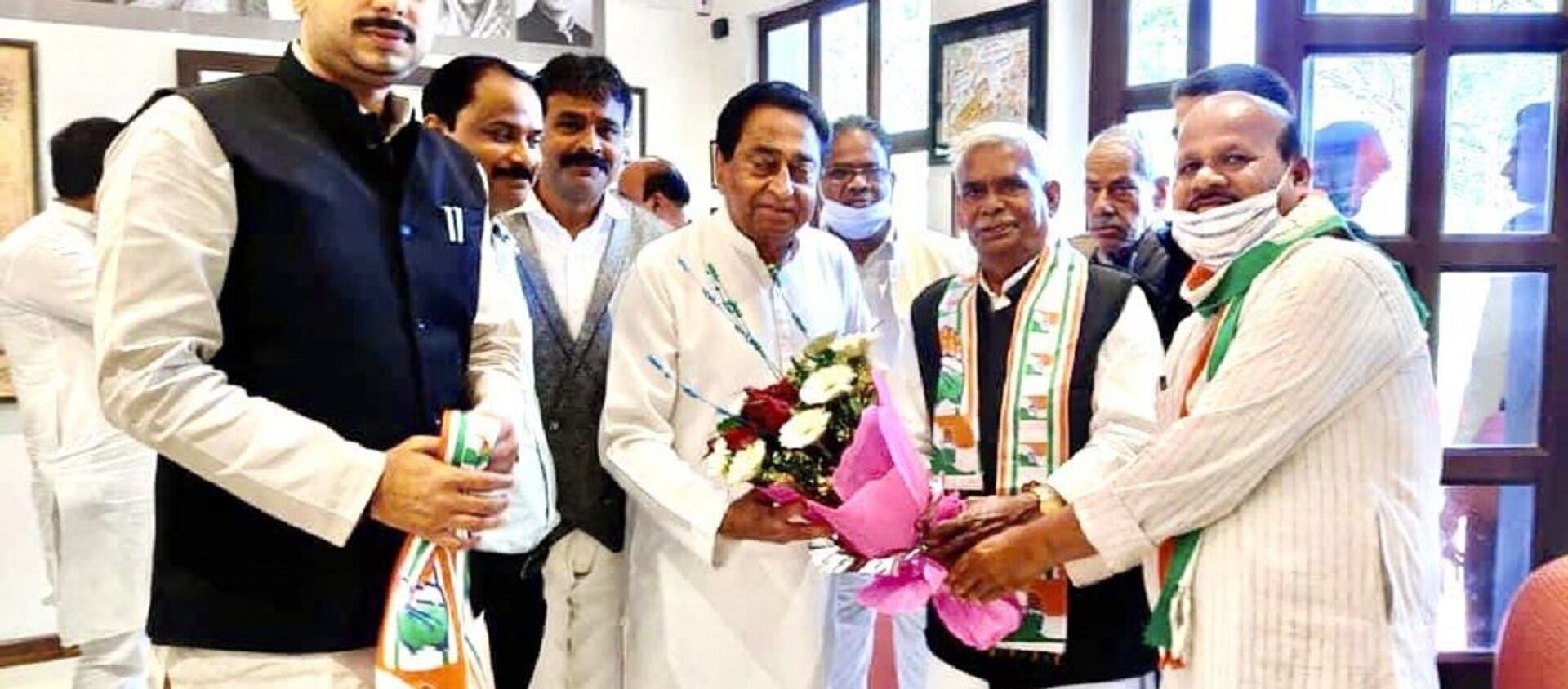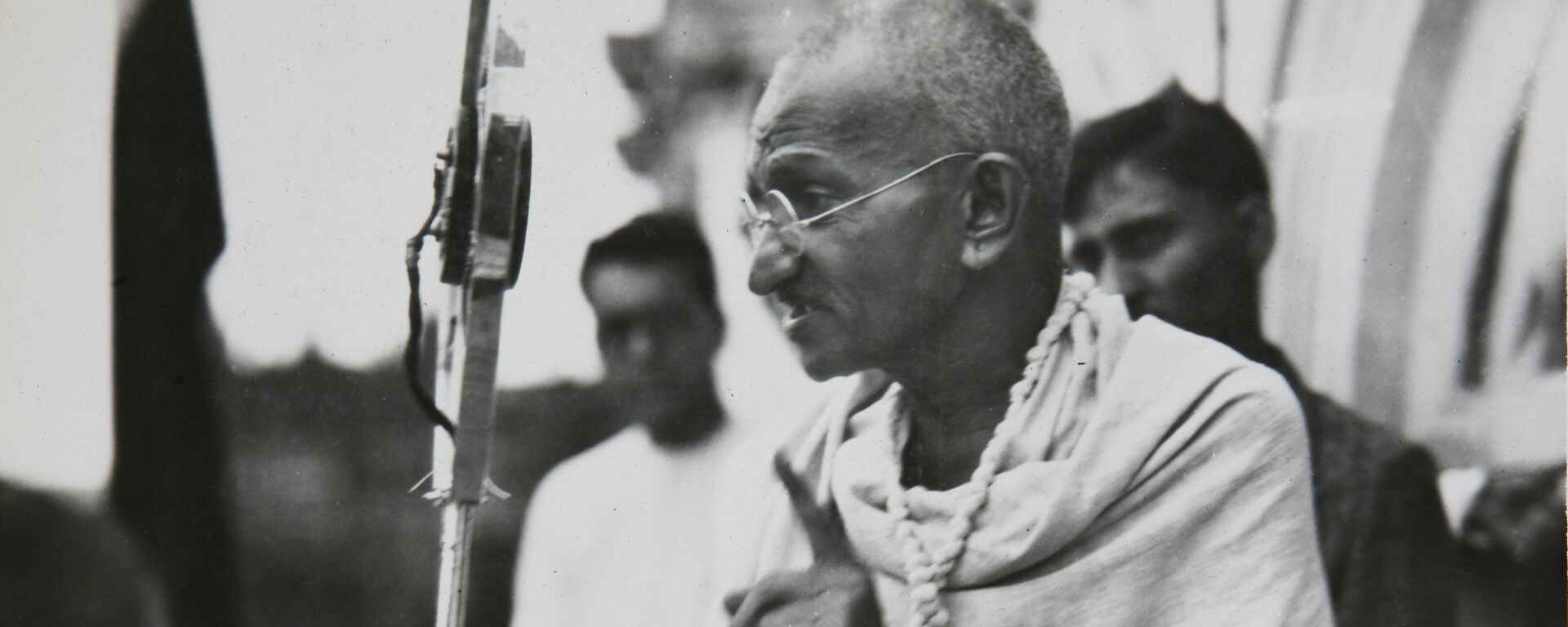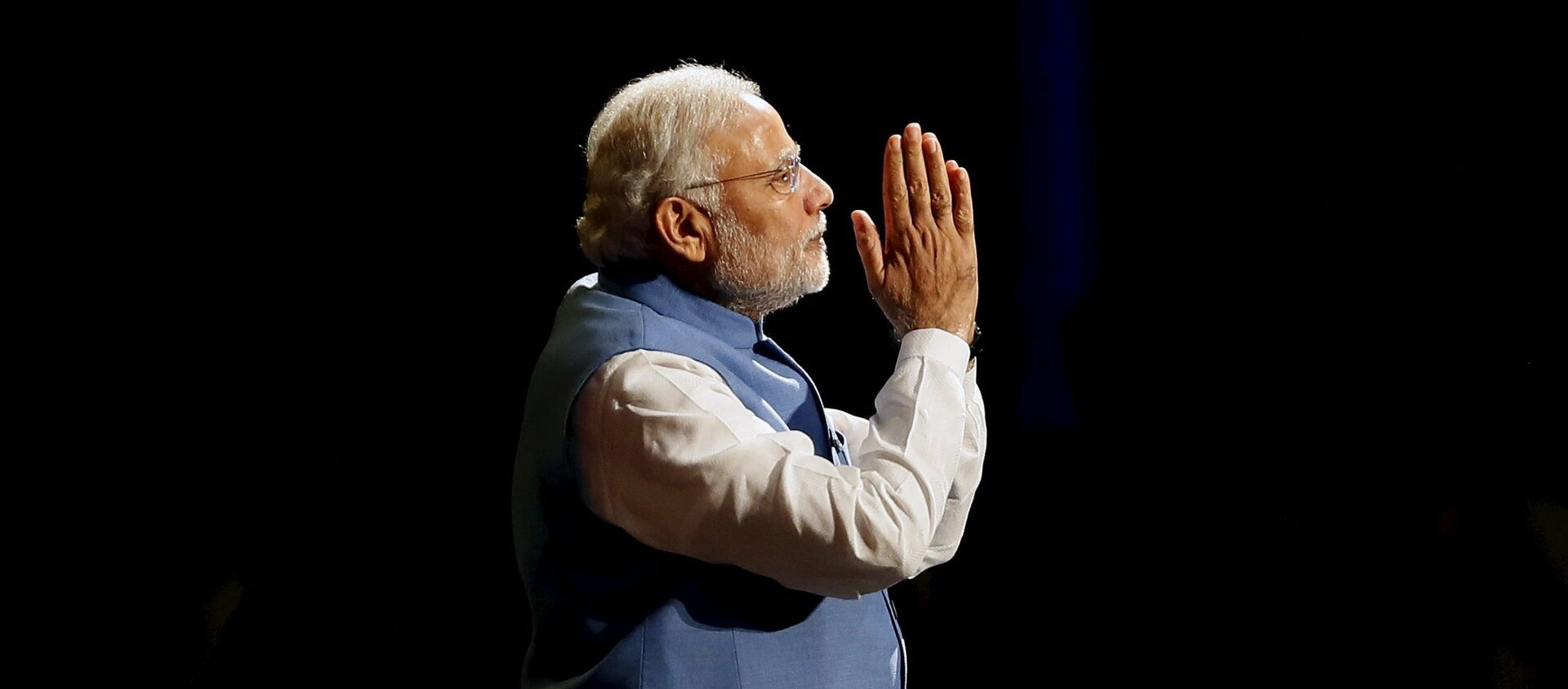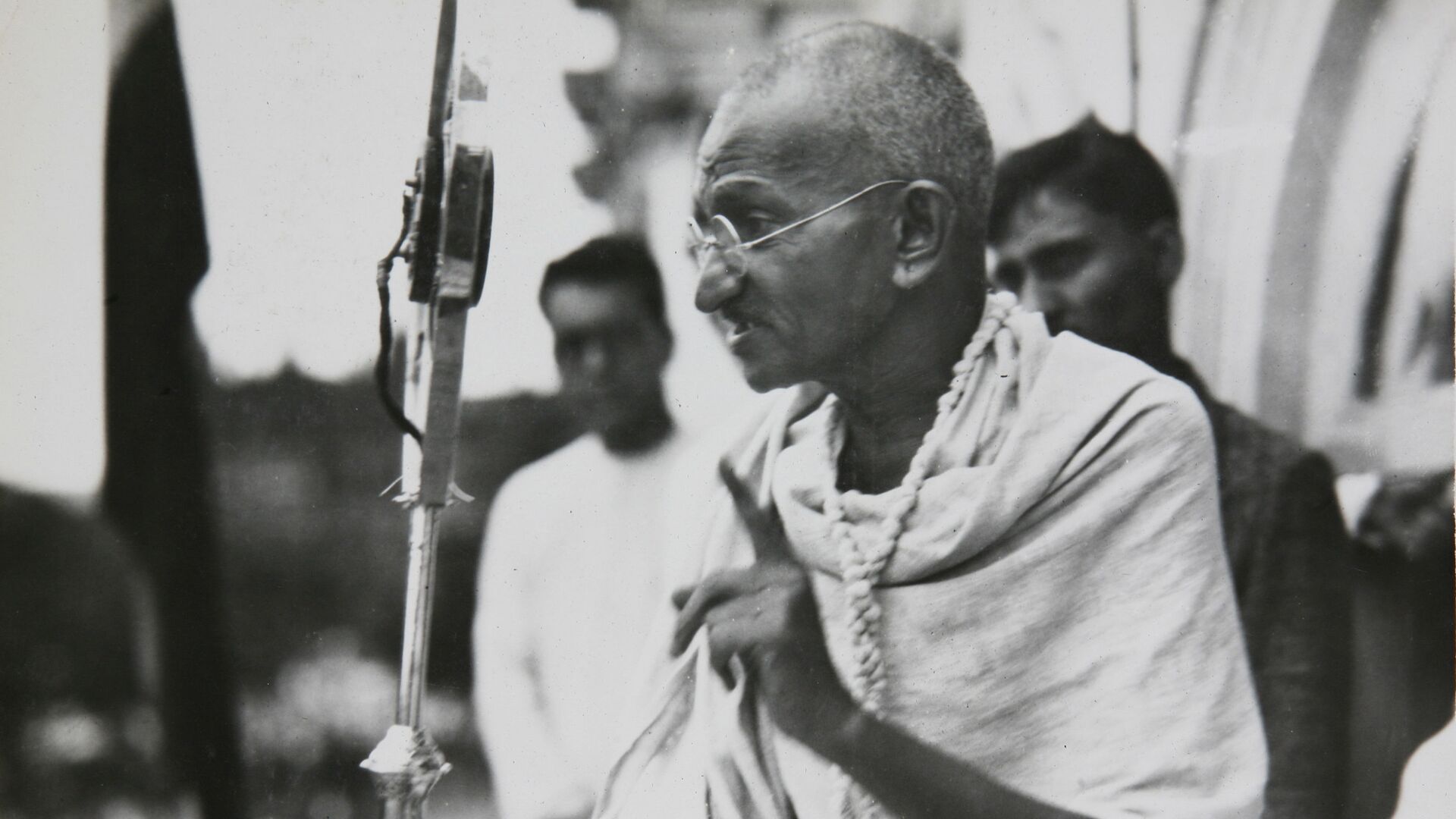https://sputnikglobe.com/20211002/mahatma-gandhis-teachings-are-being-forgotten-says-indian-scholar-1089576948.html
'Mahatma Gandhi's Teachings Are Being Forgotten', Says Indian Scholar
'Mahatma Gandhi's Teachings Are Being Forgotten', Says Indian Scholar
Sputnik International
Mohandas Karamchand Gandhi, fondly called "Bapu" (the father) was a lawyer, anti-colonial nationalist, and political ethicist who used non-violent resistance... 02.10.2021, Sputnik International
2021-10-02T06:29+0000
2021-10-02T06:29+0000
2022-07-19T10:39+0000
mahatma gandhi
indian national congress
https://cdn1.img.sputnikglobe.com/img/07e4/08/0d/1080150519_0:0:2792:1571_1920x0_80_0_0_3e18ad558f03fcabb9e21880597b3f98.jpg
Icon of Indian independence, Mahatma Gandhi, has inspired through his teachings profound research by scholars in 12 of India's universities. And today, these establishments offer dedicated courses to study the Gandhian way of life. Gandhi was the pioneer of the philosophy and strategy of non-violence.Manish Sharma, an Indian scholar of Gandhian principles and chairman of Gandhian and Peace Studies in Panjab University at Chandigarh reflects in an interview with Sputnik on what relevance Mahatma Gandhi's teachings have these days and whether his vision for a free India is being realised. Sputnik: What were the most revolutionary ideas Mahatma Gandhi proposed but you think still remain to be implemented in their true spirit? Manish Sharma: Mahatma Gandhi was way ahead of his time in the plans he had for the country he fought to free from Britain. He proposed that the role of the Indian National Congress, the party he led in 1921, should change after India attained its independence. Three days before he was assassinated, on 27 January 1948, Gandhi said in a note that the party should be dismantled and "flourish into a 'Lok Sewa Sangh' (People's Service Organisation)". This was published as an article in his own daily publication "Harijan" on 2 February 1948. He wanted this so that instead of people coming to politicians, the latter should reach out to citizens at the grassroots level to tackle their problems and offer solutions. He had proposed turning society and its system of government on its head and this has yet to see the light of day. Sputnik: How do you feel Mahatma Gandhi's doctrine is being followed more than 70 years after independence and his death? Manish Sharma: His teachings are not being followed in their true spirit by politicians in the country today. Sputnik : What are the current topics of research into Mahatma Gandhi's beliefs and how do his teachings appeal to the youth of today?Manish Sharma: People from around the world are reaching out to us to learn about Mahatma Gandhi's ideology. At present, a student from Iran is doing a doctorate on the concept of arbitration that was so close to Mahatma Gandhi's heart. As a lawyer, while dealing with his first client in South Africa, Gandhi ensured that the civil dispute was settled amicably between the parties. The strategy of using non-violence as a tool to make your voice heard is the most popular topic of research. A large number of our students are above 40 years of age. A few are as old as 65 and, for them, the pursuit of Mahatma Gandhi's philosophy is an attempt to understand the simple, truthful way of living.Sputnik: How successful have various governments in India been in embracing Mahatma Gandhi's vision for governance?Manish Sharma: Mahatma Gandhi had a well thought-out plan for effective governance of the country after India attained independence in 1947. His last signed document on 30 January 1948 was on the institutions of Panchayati Raj (grassroots level governance) that he advocated. We adopted that into our system in 1992 with the 73rd Amendment Act, but only after several changes.We need to integrate many more of his concepts, which are still available to us through his writings, into our system to become the India he dreamt of.
https://sputnikglobe.com/20210225/controversial-politician-who-praised-mahatma-gandhis-killer-joins-congress-party-1082180375.html
https://sputnikglobe.com/20200822/mahatma-gandhis-glasses-sold-at-british-auction-for-whopping-340330-bought-by-american-collector-1080247083.html
https://sputnikglobe.com/20191002/indian-prime-minister-modi-floats-einstein-challenge-in-ode-to-mahatma-gandhi-1076945295.html
Sputnik International
feedback@sputniknews.com
+74956456601
MIA „Rosiya Segodnya“
2021
Priya Yadav
https://cdn1.img.sputnikglobe.com/img/07e5/02/01/1081944855_0:29:2048:2077_100x100_80_0_0_fcca548f1670eac15afebf8b8e336044.jpg
Priya Yadav
https://cdn1.img.sputnikglobe.com/img/07e5/02/01/1081944855_0:29:2048:2077_100x100_80_0_0_fcca548f1670eac15afebf8b8e336044.jpg
News
en_EN
Sputnik International
feedback@sputniknews.com
+74956456601
MIA „Rosiya Segodnya“
Sputnik International
feedback@sputniknews.com
+74956456601
MIA „Rosiya Segodnya“
Priya Yadav
https://cdn1.img.sputnikglobe.com/img/07e5/02/01/1081944855_0:29:2048:2077_100x100_80_0_0_fcca548f1670eac15afebf8b8e336044.jpg
mahatma gandhi, indian national congress
mahatma gandhi, indian national congress
'Mahatma Gandhi's Teachings Are Being Forgotten', Says Indian Scholar
06:29 GMT 02.10.2021 (Updated: 10:39 GMT 19.07.2022) Mohandas Karamchand Gandhi, fondly called "Bapu" (the father) was a lawyer, anti-colonial nationalist, and political ethicist who used non-violent resistance to lead a successful campaign for Indian independence. His day of birth - 2 October 1869 - is today marked by the UN as the International Day of Non-Violence.
Icon of Indian independence, Mahatma Gandhi, has inspired through his teachings profound research by scholars in 12 of India's universities. And today, these establishments offer dedicated courses to study the Gandhian way of life.
Gandhi was the pioneer of the philosophy and strategy of non-violence.
Manish Sharma, an Indian scholar of Gandhian principles and chairman of Gandhian and Peace Studies in Panjab University at Chandigarh reflects in an interview with Sputnik on what relevance Mahatma Gandhi's teachings have these days and whether his vision for a free India is being realised.
Sputnik: What were the most revolutionary ideas Mahatma Gandhi proposed but you think still remain to be implemented in their true spirit?

25 February 2021, 12:12 GMT
Manish Sharma: Mahatma Gandhi was way ahead of his time in the plans he had for the country he fought to free from Britain. He proposed that the role of the Indian National Congress, the party he led in 1921, should change after India attained its independence.
Three days before he was assassinated, on 27 January 1948, Gandhi said in a note that the party should be dismantled and "flourish into a 'Lok Sewa Sangh' (People's Service Organisation)". This was published as an article in his own daily publication "Harijan" on 2 February 1948.
He wanted this so that instead of people coming to politicians, the latter should reach out to citizens at the grassroots level to tackle their problems and offer solutions. He had proposed turning society and its system of government on its head and this has yet to see the light of day.

22 August 2020, 12:46 GMT
Sputnik: How do you feel Mahatma Gandhi's doctrine is being followed more than 70 years after independence and his death?
Manish Sharma: His teachings are not being followed in their true spirit by politicians in the country today.
Mahatma Gandhi wanted politicians to be completely free of a desire for power and that they should serve selflessly, as he did himself. But politicians are fast losing touch with his teachings. In fact, the hunger for power is paramount in politics today.
Sputnik : What are the current topics of research into Mahatma Gandhi's beliefs and how do his teachings appeal to the youth of today?
Manish Sharma: People from around the world are reaching out to us to learn about Mahatma Gandhi's ideology. At present, a student from Iran is doing a doctorate on the concept of arbitration that was so close to Mahatma Gandhi's heart.
As a lawyer, while dealing with his first client in South Africa, Gandhi ensured that the civil dispute was settled amicably between the parties.
The strategy of using non-violence as a tool to make your voice heard is the most popular topic of research.
A large number of our students are above 40 years of age. A few are as old as 65 and, for them, the pursuit of Mahatma Gandhi's philosophy is an attempt to understand the simple, truthful way of living.

2 October 2019, 12:12 GMT
Sputnik: How successful have various governments in India been in embracing Mahatma Gandhi's vision for governance?
Manish Sharma: Mahatma Gandhi had a well thought-out plan for effective governance of the country after India attained independence in 1947.
His last signed document on 30 January 1948 was on the institutions of Panchayati Raj (grassroots level governance) that he advocated. We adopted that into our system in 1992 with the 73rd Amendment Act, but only after several changes.
We need to integrate many more of his concepts, which are still available to us through his writings, into our system to become the India he dreamt of.








